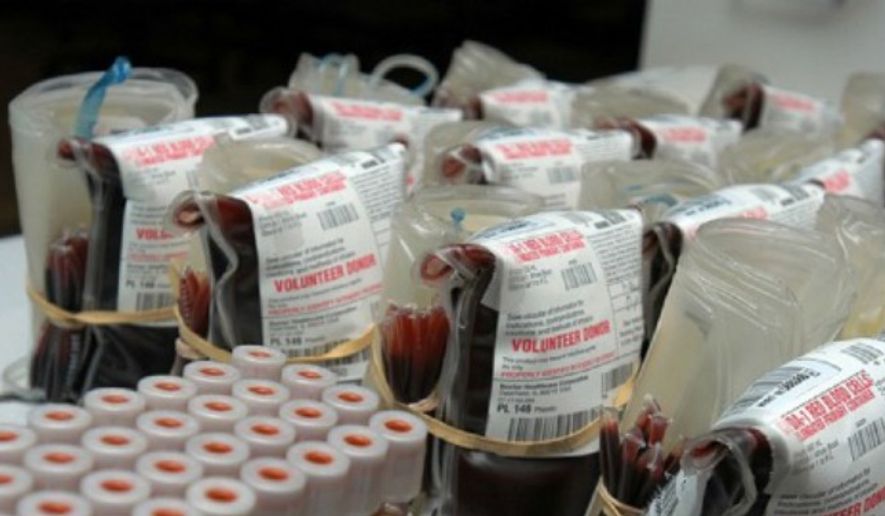The Obama administration begins a series of hearings Thursday that many expect will bring the first easing of the blanket ban on gay men donating blood, a ban that was instituted in the early days of the AIDS crisis.
Gay-rights advocates, including filmmaker Ryan James Yezak, will be on hand to urge an advisory panel of experts for the Department of Health and Human Services (HHS) to permit blood donations from men who have sex with men (MSM).
“We believe that this could be a very important moment for this issue,” said Mr. Yezak, who is executive director of National Gay Blood Drive. This summer, his group got 1,500 gay men who can’t give blood to bring “eligible allies” to donate in their places.
Other interested parties include blood-bank organizations — who support changing the permanent MSM deferral policy — and representatives of transfusion-receiving groups, who want policymakers to follow science, not politics, when updating the policy.
Members of Congress as well as gay advocacy groups have long called for an end to the “discriminatory” and “outdated” MSM policy, which permanently defers a man from donating blood if he has had sex with a man any time since 1977. The policy was started in the early years of the AIDS crisis, when it was discovered the virus could be transmitted in blood transfusions and fatally infected thousands of hemophiliacs.
On Thursday, the HHS Advisory Committee on Blood & Tissue Safety & Availability will hear results of studies on how MSM might respond to a change in blood-donation rules and current risks of transfusion-transmitted viral infections in the U.S. blood supply.
SEE ALSO: S.C. to appeal ruling striking down gay marriage ban
Dr. Richard Benjamin, chief medial director of the American Red Cross, is scheduled to talk about Australia’s policy, which permits donations from MSM who have not have sex for a year.
On Dec. 2, members of the Food and Drug Administration’s Blood Products Advisory Committee will hear findings on the MSM issue.
In 2013 correspondence with Dr. Howard Koh, HHS’ then-assistant secretary for health, the HHS blood-safety panel has urged that such a monitoring system be put in place “prior to the implementation to any change in this [MSM] deferral policy.”
It is not immediately clear how experts might advise on changing the MSM policy. While there is wide agreement that the current policy is “suboptimal,” there may not be a consensus on how to change it.
Some countries, such as Australia, require one to several years of sexual abstinence before a gay or bisexual man can be a blood donor. Other countries, such as Italy and Spain, defer donors if they have engaged in risky sexual practices or had more than one sex partner in recent months.
Groups representing hemophiliacs and other blood recipients, who are watching this issue closely, maintain that the safety of the blood supply is paramount.
Meanwhile, the supply of blood units appears to be surpassing demand.
In the HHS’ most recent report on blood donations and uses, it found that 15.7 million units of whole blood and red blood cells were collected in 2011, a decline of 9 percent from 2008. However, the total number of units transfused that year dropped to 13.7 million, about 8 percent lower than in 2008.
“It is possible that this decline in transfusion rate is a residual of the recession, but more likely it is an indication of the growing adoption of blood-management practices,” said the 2011 National Blood Collection and Utilization Survey Report.
• Cheryl Wetzstein can be reached at cwetzstein@washingtontimes.com.




Please read our comment policy before commenting.